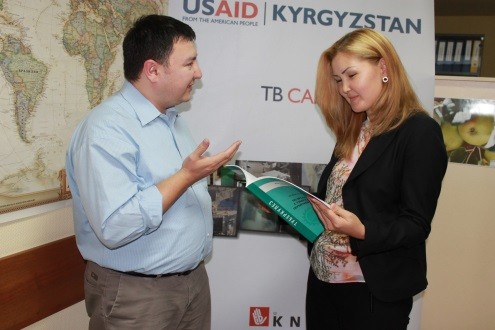
Feb. 2015--In Kyrgyzstan, where the prevention, detection and treatment of tuberculosis (TB) is a major public health concern, new methods of patient-centered care are being developed to combat the disease. The Kyrgyz National TB Program has begun piloting full outpatient care, allowing TB patients to be treated without hospitalization.
With the support of the USAID-funded TB CARE I project, the pilot currently involves 72 patients in the urban setting of Bishkek, the country’s capital, with an 86 percent treatment success rate.
Aizada Abdykadyrova, a young mother and former TB patient, moved from her native Naryn to Bishkek as a child. At the age of 15, she dreamt of becoming a model. After becoming ill with what she initially believed was pneumonia, Abdykadyrova was subsequently diagnosed with TB. The diagnosis was devastating, and despite pleas to be cared for at home, she was admitted for treatment at the hospital—a deteriorating, government-run TB facility where she had no access to her loved ones.
After several months of treatment, Abdykadyrova was discharged and she returned home. Although she tried to put the experience behind her, the emotional and physical scars remained.
Later, she learned English and, like many people in Central Asia, she went in search of better employment opportunities to Dubai, where she worked in fashion retail as an immigrant worker. Abdykadyrova returned to Kyrgyzstan for a couple of years to get married and have a child and then returned to Dubai. During a routine health assessment, two of her Filipino coworkers were diagnosed with TB, which led to a full workplace screening. Abdykadyrova received the crushing news that she had again contracted the disease. She was immediately deported, having spent only a couple of months in Dubai.
As Abdykadyrova recounts the story, she winces: “You can’t even begin to imagine how shocked I was to hear the news. It broke my heart to think I’d have to relive the trauma of that experience all over again.”
Back in Bishkek, she went to the city TB center for treatment. As she choked back painful memories of her previous treatment and the isolation she experienced, to her surprise she was informed that the facility was part of a pilot project that advocated for outpatient care. No longer would she have to be separated from her family or suffer through the shame and trauma of protracted hospitalization; she could enjoy the convenience, safety and anonymity of outpatient treatment.
“The community nurse who oversees my treatment is wonderful. She ensures that I take my medication and never alters our routine of care,” says Abdykadyrova. In contrast, she remembers that during her first hospitalization, “personnel were never strict and often gave me pills to take on my own.”
She notes that the opportunity to get excellent, supervised treatment close to home has made it far easier to cope with the disease, and has led her to full recovery. When learning that this new process was being piloted by the TB CARE I project with the hope of universal availability, she pledged her support.
“I’ve never concealed my TB story; in fact, I wish more patients knew they had the kinds of options for treatment that make full recovery easier. Perhaps my voice can strengthen the call on authorities to widen the practice of outpatient care.”
Abdykadyrova successfully completed TB treatment and is now exploring new avenues to influence decision makers to scale up the outpatient model of treatment. In collaboration with the Kyrgyz National Red Crescent Society, which trains former TB patients as activists, Abdykadyrova is hoping to become a Global Fund Country Coordinating Mechanism member to help others affected by the disease and to encourage changes in her country’s health care policies.
The TB CARE I project in the Kyrgyz Republic was completed in January 2015.
LINKS







Comment
Make a general inquiry or suggest an improvement.